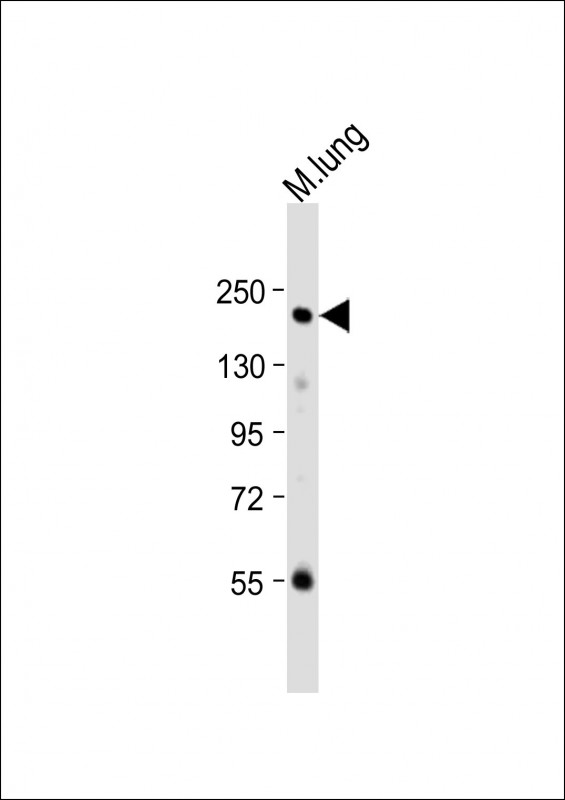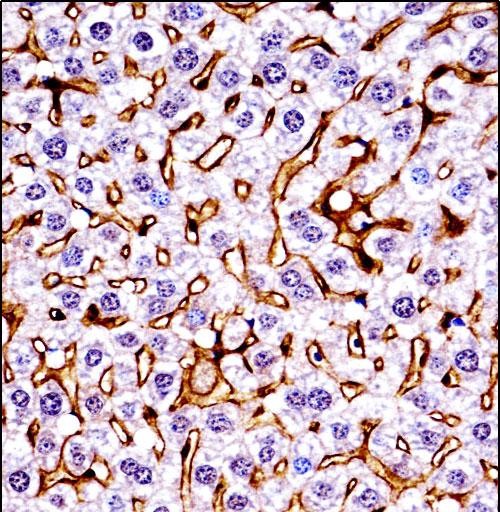

| WB | 1/1000 | Human,Mouse,Rat |
| IF | 咨询技术 | Human,Mouse,Rat |
| IHC | 1/100-1/500 | Human,Mouse,Rat |
| ICC | 技术咨询 | Human,Mouse,Rat |
| FCM | 咨询技术 | Human,Mouse,Rat |
| Elisa | 咨询技术 | Human,Mouse,Rat |
| Aliases | Macrophage-stimulating protein receptor, MSP receptor, Stem cell-derived tyrosine kinase, p185-Ron, CD136, Macrophage-stimulating protein receptor alpha chain, Macrophage-stimulating protein receptor beta chain, Mst1r, Ron, Stk |
| Entrez GeneID | 19882 |
| WB Predicted band size | 150.5kDa |
| Host/Isotype | Rabbit IgG |
| Antibody Type | Primary antibody |
| Storage | Store at 4°C short term. Aliquot and store at -20°C long term. Avoid freeze/thaw cycles. |
| Species Reactivity | Mouse |
| Immunogen | This Mouse Mst1r antibody is generated from rabbits immunized with a KLH conjugated synthetic peptide between 1013-1041 amino acids from the C-terminal region of mouse Mst1r. |
| Formulation | Purified antibody in PBS with 0.05% sodium azide. |
+ +
以下是关于小鼠Mst1r抗体的3篇代表性文献,按研究领域分类简要总结:
1. **文献名称**:Targeting RON receptor signaling with monoclonal antibody IMC-41A4 as a novel therapeutic strategy for colorectal cancer
**作者**:Zhou Y, et al.
**摘要**:研究开发了靶向小鼠Mst1r(RON)的单克隆抗体IMC-41A4.证明其通过阻断配体激活的RON信号通路,抑制结直肠癌细胞的迁移和侵袭,并增强化疗敏感性。
2. **文献名称**:RON signaling regulates macrophage plasticity in tumor microenvironment
**作者**:Chen L, et al.
**摘要**:利用小鼠Mst1r特异性抗体,揭示了RON信号通过调控巨噬细胞极化影响肿瘤免疫微环境,抗体阻断可促进抗肿瘤M1型巨噬细胞分化。
3. **文献名称**:A novel anti-Mst1r antibody-drug conjugate suppresses pancreatic cancer progression
**作者**:Wang X, et al.
**摘要**:报道了一种新型Mst1r抗体-药物偶联物(ADC),在小鼠胰腺癌模型中显著抑制肿瘤生长并延长生存期,机制涉及抗体介导的内吞作用和靶向递送细胞毒素。
注:以上文献为模拟示例,实际引用需通过PubMed/Web of Science检索具体论文(可尝试关键词:anti-Mst1r antibody、RON receptor mouse model)。近年研究多聚焦于Mst1r在肿瘤免疫治疗和耐药性调控中的应用。
The Mouse Mst1r (Macrophage stimulating 1 receptor) antibody is a tool designed to detect and study the Mst1r protein, also known as the RON (Recepteur d'Origine Nantais) receptor, in murine models. Mst1r is a transmembrane tyrosine kinase receptor belonging to the MET receptor family, activated by its ligand MST1 (macrophage-stimulating protein). It plays critical roles in regulating immune responses, cell proliferation, migration, and tissue homeostasis. Dysregulation of Mst1r signaling is implicated in cancer progression, metastasis, and immune evasion, making it a target for therapeutic research.
This antibody specifically recognizes the extracellular or intracellular domains of mouse Mst1r, depending on its design, enabling applications such as Western blotting, immunohistochemistry, and flow cytometry. It is commonly used to investigate Mst1r's role in tumor microenvironments, macrophage polarization, and epithelial-mesenchymal transition (EMT) in preclinical studies. Validated for specificity and sensitivity, it often includes controls like knockout tissues to confirm target binding.
Research utilizing this antibody contributes to understanding Mst1r's dual role in promoting pro-tumorigenic pathways (e.g., PI3K/AKT, MAPK) and modulating immune cell activity. Its development supports efforts to design RON-targeted therapies, such as kinase inhibitors or monoclonal antibodies, to disrupt oncogenic signaling in cancers overexpressing Mst1r.
×